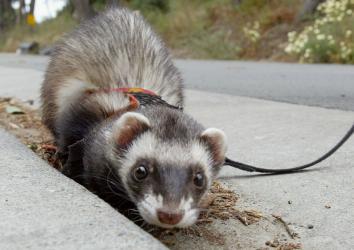In June 1999, prompted by the Giuliani administration, the New York City Board of Health voted to include ferrets on its comically elaborate list of banned creatures, where they joined polar bears, venomous centipedes, zebras, and “all non-human primates.” New York City had already disallowed ferrets in 1959, and Giuliani’s administration had fought off legal challenges to that ban, but that evidently wasn’t enough. These weasels pose a special danger to children, the city reasoned, saying their attacks on infants and other people were “notorious for their severity and capriciousness.”
About a month later, a caller phoned in to Mayor Giuliani’s radio show on behalf of a pro-ferret organization that sought to legalize keeping the critters as pets. Giuliani hung up on the man, but that didn’t stop him from launching into an unhinged, now-famous tirade, decrying the man’s “excessive concern with little weasels” with characteristic deafness to irony. In 2007, Rob Donnelly charmingly animated the screed for Slate, and its glory has not faded:
Of course, if anyone had an excessive fixation on ferrets at the time, it was Rudy Giuliani, who compared keeping them to owning a lion or tiger. When the New York City Council voted to legalize their ownership in the city in 2001, Giuliani immediately vetoed the new rule, berating the council and warning that ferrets are “naturally inclined to do harm.” Mayor Michael Bloomberg’s administration was not moved to revisit the issue, defending the Giuliani ban successfully in court.
But now, a brighter day may be in store for the ferret in New York City. Mayor Bill de Blasio, noted for his promises to liberate New York horses from the Central Park carriage business, appears to be contemplating a policy shift on the creatures. The New York Times obtained an internal memo that recommended rescinding the ban, pointing out that there is little evidence ferrets are more vicious or dangerous than cats or dogs. The memo is optimistic about the administration’s chances at a repeal.
New York City is among the last holdouts in the country with a persistent aversion to ferrets—only California, Hawaii, and Washington, D.C. have similarly restrictive rules. It’s perfectly legal to keep ferrets in New York state, for example, minutes north of the city limits. So why the weasel worry? For one thing, the city considers ferrets wild animals, which is a fairly anomalous stance since most researchers agree that they have been domesticated for 2,000 years or more. Although the full timeline isn’t clear, one 2012 study in PLOS ONE noted that they were descended from the European polecat and likely first trained to assist with hunting and vermin control. Keeping the animals as house pets is a more recent phenomenon in the United States, where ferrets likely arrived in the 19th century, but now, according to the American Veterinary Medical Association, there are about 748,000 ferrets living in American homes.
In the past, some ferret opponents have raised the specter of rabies, but the Centers for Disease Control and Prevention offers identical guidelines for cats, dogs, and ferrets, and vaccinations have been approved. There’s also the persistent belief that ferrets are dangerous to human babies; De Blasio’s internal memo ominously notes that “there may be injuries, especially to infants.” One widely cited ’80s report in the journal Pediatrics suggests that human babies may remind ferrets of suckling rabbits, and there are certainly some ghastly tales out there. But, again, the CDC calls for caution and supervision for all contact between any animal species and children younger than five, advice echoed by others, and I found no recent literature to suggest ferrets are more of a danger to children than cats or dogs.
Perhaps the anxiety in New York is more cultural. The AVMA still considers ferrets a “specialty or exotic” pet. Ferrets have a reputation for being especially unpredictable and wily, contrary to the image of highly trainable creatures most owners have worked to project. If rats can colonize corners of the city at will, what might ferrets do? Even the sympathetic Times report on De Blasio’s plans traded on the animals’ roguish reputation, referring to them as “mercurial,” “sharp-toothed,” and “musky.” Maybe we need look no further than the immutable cultural barometer that is the Mountain Dew commercial, one of which, in 2007, linked ferrets with grizzly bears and Leatherface:
Maybe the arrival of ferrets to the cramped apartments of the United States’ biggest city will help them shed that lingering suspicion once and for all, vaulting them to the rarefied place of cats and dogs at our sides. At the very least, they’ve earned a trend story. Giuliani himself piped up about the news, offering an unlikely shrug at the new mayor’s plan, saying it makes sense if promoted by “the right scientific backup.” Even capricious little weasels deserve vindication.
